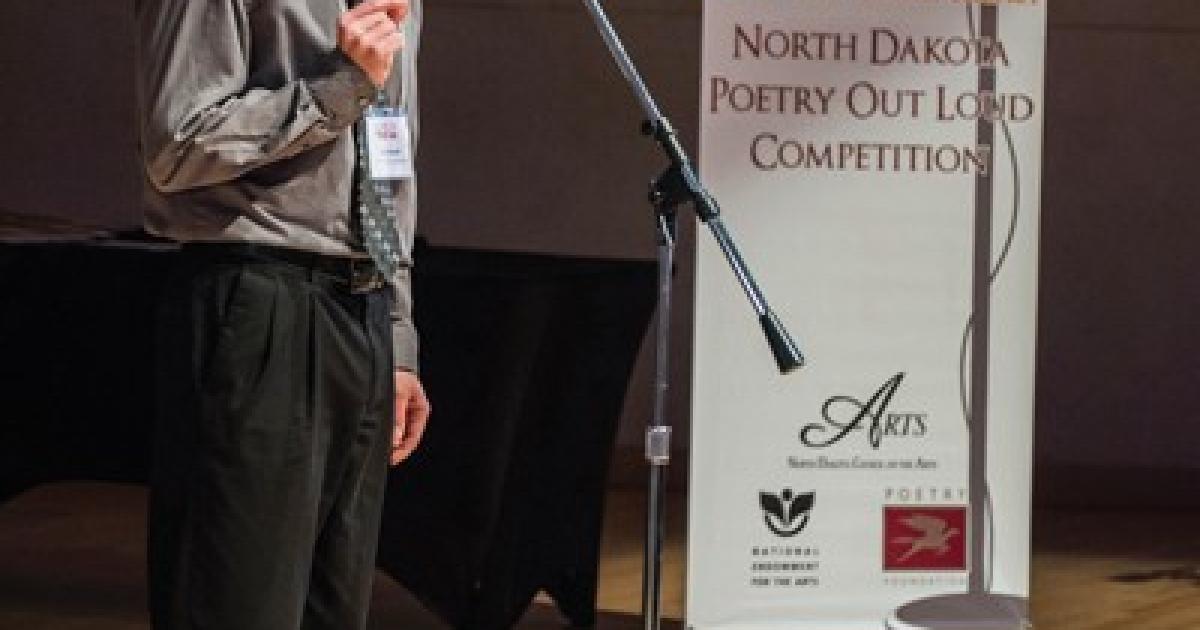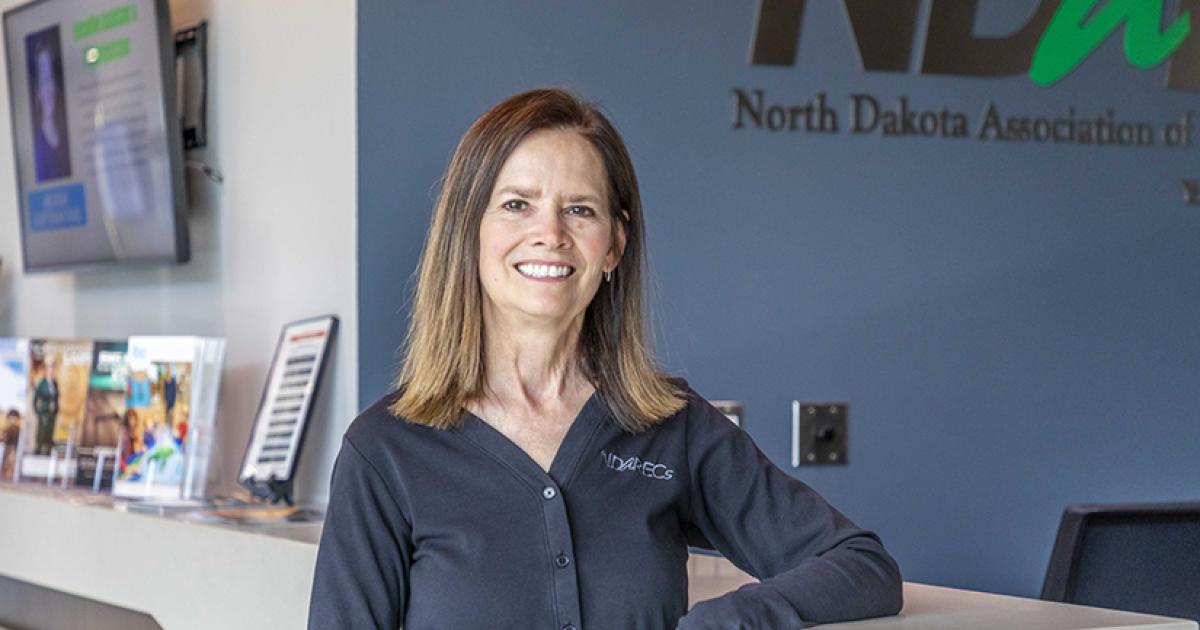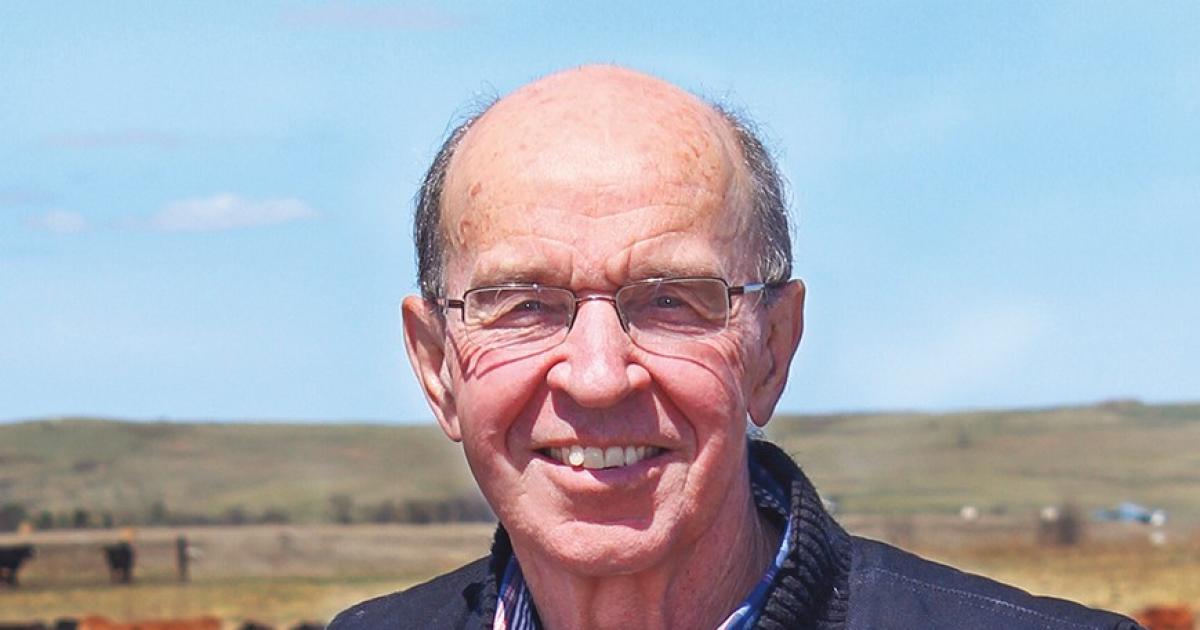Although today’s teenagers often express themselves through mobile devices, Elizabeth Holzer has found an old-fashioned mode of communication she values. Holzer, a senior at Legacy High School, Bismarck, has an affinity for poetry as a way to understand herself and her world.
Zachary Howatt, from Northern Cass High School, performs a recitation at the 2017 state competition which he won.(Photos courtesy N.D. Co)
“I think poetry really helps you explain who you are, and helps you develop the person that you are,” Holzer says. She enjoys studying the sentences in poems, breaking down the meanings, and arriving at understandings expressing herself as a person.
Holzer’s devotion to poetry has lifted her to a high level of achievement in the poetry realm. She earned the spot as Legacy High School’s representative at the statewide level in the 2018 Poetry Out Loud (POL) competition. POL is a program of the National Endowment for the Arts. It is a staged competition, beginning locally and leading to a national winner. Appreciation, memorization and recitation performance of poetry by high school students is the emphasis.
The North Dakota stage of the POL competition is coordinated by the North Dakota Council on the Arts, a state agency.
Since 2005, POL has grown to reach more than 3 million students and 50,000 teachers from 10,000 schools nationwide.
Rebecca Engelman, education director for NDCA, coordinates the program, furnishing participating high schools with direction for conducting local POL competitions.
“Our high schools register for the Poetry Out Loud program, and we provide them support and teacher resources to implement poetry and memorization and recitation in their classrooms,” Engelman says. The national POL organization furnishes the anthology of poems from which reciters can select poems for memorization.
Engleman says school competitions often begin in classrooms, with finalists moving on to an all-school competition. This year’s state POL competition occurred in late February. Competitors from 20 high schools vied for the state title. Each competitor at the state level must have three poems ready for competition presentation. Two preliminary rounds are conducted, and a final round determines a winner.
The 2017 state POL winner was Zachary Howatt, representing Northern Cass High School, at the national finals in Washington, D.C. The 2018 national competition returns to Washington, D.C., April 23-25.
N.D. Poetry Out Loud schools – big boosters
At schools sending POL competitors to the state competition, faculty coordinators are big boosters of the program, and big believers in the importance of poetry. Among these boosters and educators are:
Bismarck Legacy High School’s Mandy Wardner, English instructor and theater director. Wardner leads the school’s participation in the POL program, which produced Elizabeth Holzer as their 2018 POL state competition entrant.
“My high school speech coach always stressed that importance of language – the beauty of language and how important words are. Words matter,” Wardner says.
She says young people today feel deeply, but don’t know how to express themselves. “They struggle with ‘How do I say what I'm trying to say. How do I say what I feel?’ We can show them the beauty of words, and the beauty of language. There's a poem that can say it for you,” she says.
Wardner adds that memorizing poetry, for group recitation, holds more value now than ever. In this age where electronic devices provide easy shortcuts for communication and learning, the brain exercise which poetry mastery requires is vital.
“We get so wrapped up in the quick instant gratification that technology gives us,” Wardner says. “This recitation forces us to step back. It makes us use our brain in a different way – with memorization, which is an incredibly important skill.”
Ray High School’s Justine Haase, who teaches English for grades 8-12, is in the early stages of her teaching career, and is working hard to pass along passion for poetry. With her students, “I just try to get them to connect poetry with their lives,” Haase says.
Haase says she senses dread from students when they first look at poetry in school literature textbooks, but she works around it. “It shouldn’t be like that, so I usually try to mix in some contemporary poetry. I just want them to know that with poetry you can write about everyday things. Poetry can be literally about anything,” she says.
This year, Haase showed students the rules for writing limericks, and many were soon composing them.
Haase says recitation is the part that “most kids still aren't thrilled about doing.” She allows students time to look through the anthology of poems, and know that their embrace of a poem will make the recitation path easier to walk.
“There are always those who you can tell took the time finding their poem, and they relate to it just by the way they perform it,” Haase says. She adds that the POL program is an excellent stimulus for student recitation of poems.
Northern Cass High School’s Don Hollister, English teacher, says he, too, experiences the dread Justine Haas’ students convey when poetry lessons commence.
“There is always push back, initially,” Hollister says, “and as we get further into poetry, the pushback gets even greater because the students realize how complex it is and how much work goes into deciphering exactly what’s on the page.”
But, Hollister says, the students do persevere and do overcome initial frustrations. “Once they get to the end of some of the poems, they realize what’s there and what it took to communicate that. Then they start to respect poetry more.”
He says recitation, which is also scary to students, boosts understanding of and appreciation for the messaging of poetry, and its human qualities.
“The vast majority of them really work hard to memorize their poems, and then several of them go to that next level, where they don't have it just memorized – they have the motions and the enthusiasm, and the emphasis is added in there. And they do so well when they perform. It's pretty inspiring,” he shares.
Bismarck High School’s Andrew Fischer, also an English teacher, says his key to excite students about poetry is to get it to their level.
“I think it’s just making it relevant to them. Teaching them that it’s all around us anyway, and not to think that it’s this daunting cloud,” Fischer says. “You can see poetry in commercials, you see it on the street, and you see it in your music that you’re listening to. It’s the reality of how people convey themselves through words,” he says.
Fischer says he plays music to which students can relate, as a way to emphasize how words and figurative language attract them.
For recitation, Fischer says he stresses conveying the essence of a poet’s style. “I tell my students that the highest level of analysis is imitation, so when they choose the poem that they are going to memorize, they have to imitate that author’s style,” he says.
Fischer says his poetry classes have participated in POL for many years.
“It has been the vehicle I use to teach poetry,” Fischer says. “It's a really easy way to incorporate memorization and the study of poetry. And it’s sort of a real cherry on top to be able to suggest that students can compete against their peers.”
“I think the North Dakota Council on the Arts has done a fantastic job of trying to breathe life into poetry, so I'm going to support this as long as I can,” Fischer adds.
Rigors, rewards of POL competition
Rebecca Engelman says formal competition judging of POL competitors is done from these standpoints: physical presence; voice and articulation; dramatic appropriateness; evidence of understanding; overall performance; and accuracy. These achievement standards are used in local competitions and remain pivotal all the way through the selection of the national champion.
Each winner at the state level receives $200 and an all-expenses-paid trip with an adult chaperone to Washington, D.C., to compete for the national championship. The state winner's school receives $500 for the purchase of poetry books. The first runner-up in each state receives $100, with $200 for his or her school.
A total of $50,000 in awards and school stipends is awarded annually at the national POL finals.
Kent Brick is editor of North Dakota Living. He can be reached at kbrick@ndarec.com.










